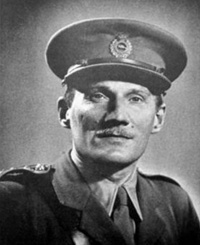Edward Cecil Evans Fox
From The Space Library
Chairman of the Canadian Rocket Society, Edward Evans Fox was an officer in the 8th Field Company of the Royal Canadian Engineers. In the 1920s he worked for the Dominion Bridge Company and was involved in building both the Royal York Hotel in Toronto and the James Bay extension of the T and NO Railway. He married Guida Maxwell of Germantown Philadelphia in 1928.
A fan of Jules Verne, one of his claims to fame was erecting the steel for the Royal York hotel in the 1920s. In August 1940 he wrote Navigation for Emergencies in which he invented new methods for celestial navigation later used by the RCAF and the USAAF. The success of his method even brought him to the attention of King George VI.
By November 1946 Fox had generated so much publicity with his talk of moon rockets that he appeared on a radio show named "Canadian Cavalcade" (at the time introduced by Lorne Greene.) During an interview he stated that he expected men to land on the moon within 20 years and that he had written an 80,000 word sequel to his navigation treatise, this time for space navigation.
In June 1948 in front of a gathering of 100 attendees at the Royal Ontario Museum Fox and Kurt Richard Stehling outlined the aims of their society. Stehling stated, "We are interested in the peacetime use of rockets, not their development for war. We hope to interest the public not only in the mechanical side of rockets but in their social and economic significance."
In August of 1948 Fox' design for a proposed 200' tall lunar rocket was displayed at the Canadian National Exhibition.
That December the group again appeared in the newspapers with their predictions for a manned lunar vehicle to be built by 1960; costing about $5M, 200' high, nuclear powered and taking four days to make the trip.
The CRS attracted J.F.Heard, Chairman of the National Research Council, who spoke to their membership in March 1949 on interplanetary travel. Four months later Fox took the plans for their moon rocket to New York where he met with aviation pioneer Alexander de Seversky to discuss his rocket designs. His meeting garnered the attention of the New York Times.

